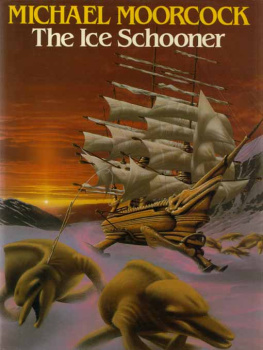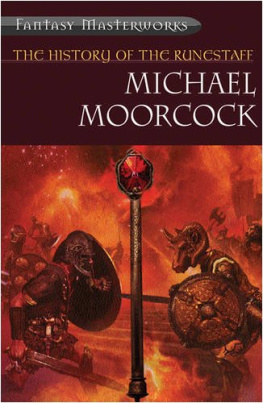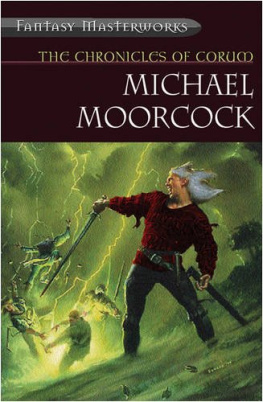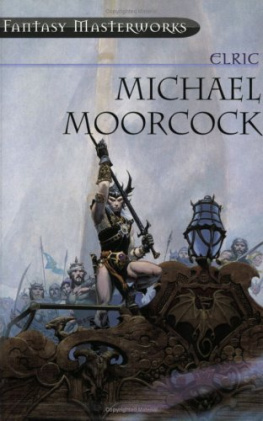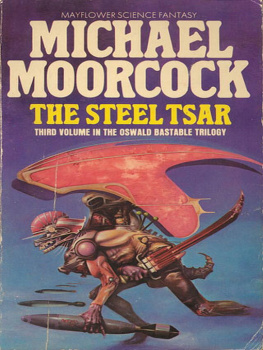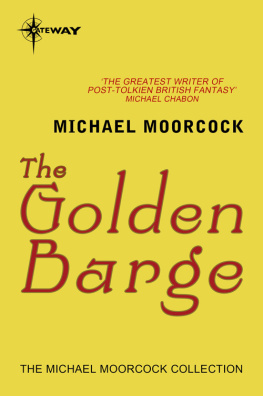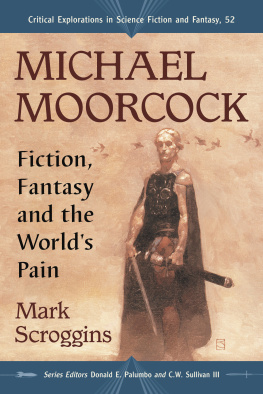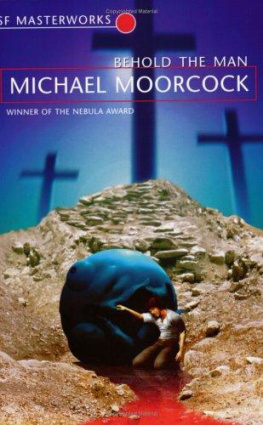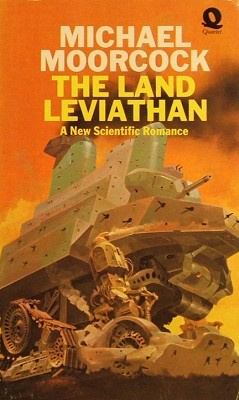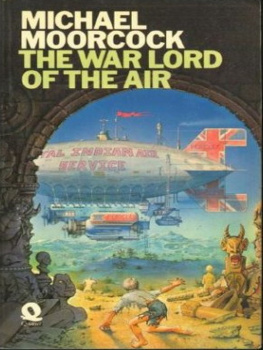Michael Moorcock - The Ice Schooner
Here you can read online Michael Moorcock - The Ice Schooner full text of the book (entire story) in english for free. Download pdf and epub, get meaning, cover and reviews about this ebook. year: 1985, publisher: George G. Harrap & Co., genre: Detective and thriller. Description of the work, (preface) as well as reviews are available. Best literature library LitArk.com created for fans of good reading and offers a wide selection of genres:
Romance novel
Science fiction
Adventure
Detective
Science
History
Home and family
Prose
Art
Politics
Computer
Non-fiction
Religion
Business
Children
Humor
Choose a favorite category and find really read worthwhile books. Enjoy immersion in the world of imagination, feel the emotions of the characters or learn something new for yourself, make an fascinating discovery.
- Book:The Ice Schooner
- Author:
- Publisher:George G. Harrap & Co.
- Genre:
- Year:1985
- Rating:3 / 5
- Favourites:Add to favourites
- Your mark:
- 60
- 1
- 2
- 3
- 4
- 5
The Ice Schooner: summary, description and annotation
We offer to read an annotation, description, summary or preface (depends on what the author of the book "The Ice Schooner" wrote himself). If you haven't found the necessary information about the book — write in the comments, we will try to find it.
The Ice Schooner — read online for free the complete book (whole text) full work
Below is the text of the book, divided by pages. System saving the place of the last page read, allows you to conveniently read the book "The Ice Schooner" online for free, without having to search again every time where you left off. Put a bookmark, and you can go to the page where you finished reading at any time.
Font size:
Interval:
Bookmark:
When I was writing my novel The Ice Schooner for NEW WORLDS now sadly defunct companion magazine IMPULSE, Keith Roberts (author of The Furies) was then editing the magazine and worked closely on the serial. He worked so closely, in fact, that he became himself interested in the world of the new Ice Age which was the background to my story, had certain ideas about how he would handle it if he were writing it, decided he would write it anyway and the result was this fine story told in a manner reminiscent of Dunsany at his best.Michael Moorcock.
There was a woman in the great cleft-city of Brershill who was passing fair.
At least so ran opinion in that segment of low-level society of which she was undisputed queen. Though there were others, oldsters for the most part, who resented her beauty, finding her very fame an affront to decent living. Custom died hard in Brershill, most conservative -- or most backward of the Eight Cities of the Plain, the great ice steep men had once called the Matto Grosso. And in truth Coranda had given some cause for offence. If she was beautiful she was also vain and cold, cold as the ice plains that girdled the world: in her vanity she had denied even that sacrifice most beloved of great Ice Mother, the first-blood that belonged to the goddess alone. Long past the time of puberty she was, and the ceremonies of womanhood; and still the Mother waited for her due. In the blizzards that scourged the cleft, in the long winds of winter, her complaint might be heard, chilling the blood with threats and promises. All men knew they lived by the Mothers mercy alone; that one day, very soon now, the world would end, mantled for eternity in her sparkling cloth. Coranda, ran the whisper. Coranda, holding their lives in the hollow of her hand. Coranda heard, and laughed; she was just twenty, slim and black haired and tall.
She lay on a couch of white fur, toying with a wine cup, mocking the young men of the cities as they paid her court. To Arand, son of the richest merchant of Brershill, she confided her belief that she herself was of the Mothers Chosen and thus above the pettiness of sacrifice. For, she said, smoothing her long hair, is not the Mother justly famed for beauty, for the perfection of skin that matches the fresh-laid snow? The darkness of her eyes, all-seeing, the slenderness of the hands that guard us all? And have I not -- she tossed her head -- have I not, among your good selves at least, some claim to prettiness? Though Eternal Mother forbid -- blushing, and modestly lowering her eyes -- that I should fall into the sin of pride. Arand, more than a little drunk, straightway burbled her divinity, speaking heresy with the ease of long practice or stupidity till she swept from him indignantly, angry that he should speak lightly of the deity in her presence. Will not the Mothers rage, she asked Maitran of Friesgalt appealingly, descend alike on his head and mine? Will you protect me from the lightnings that fly in storms, lightnings such words may bring?
That was a cunning touch, worthy of Coranda; for the animosity with which most Friesgaltians regarded the folk of Brershili was well known, Maitrans knife blade gleamed instantly, and would no doubt have brought the Mother a pleasing offering had not Brershillian stalwarts pinned and disarmed the combatants. Some blood was shed certainly, from thumped noses and mouths, while Coranda regarded the wriggling heap with interest. Now, she said, I think I must call my fathers men, to punish; for do I mean so little to you all that you come here to my house and brawl? She ran to the gong placed beside the door of the chamber, and would certainly have summoned an irate guard had not earnest entreaty prevailed.
Well, she said, tossing her head again in disgust. It seems you all have too much spirit, and certainly too much energy, for my comfort and your own safety. I think we must devise a small occupation, something that will absorb your wildness and will no doubt bring a suitable reward.
There was a quietness at that; for she had hinted before that marriage to some rich and worthy boy might at long last assuage the Mothers need. She brooded, suddenly thoughtful, stroked hands across her gown so the fabric showed momentarily the convexities of belly and thighs. Lowered her eyes, glided swaying to the couch. They made way for her, wary and puzzled. Rich they all were, certainly, or they would none of them have passed her fathers iron- bound doors; but worthy? Who could be worthy of Coranda, whost beauty was surely Ice Mothers own?
She clapped her hands; at the gesture a house-servant, blue livened, laid beside her a box. It was made from wood, rarest of substances, inlaid with strips of ivory and bone. She opened it languidly; inside, resting on a quilting of white nylon, was a slim harpoon. She lifted it, toying with the haft, fingers stroking the razor edges of the barbs. Who will prove himself? she asked, seemingly to the air. Who will take the Mothers due, when Coranda of Brershill comes to marriage?
Instantly, a babble of voices; Karl Stromberg and Mard Lipsill of Abersgalt shouted willingness, Frey Skalter the Keltshillian, half-barbaric in his jewelled furs, attempted to kiss her foot. She withdrew it smartly, equally sharply kicked him in the throat. Skalter overbalanced, swearing, spilling wine across the pale floor. There was laughter; she silenced it sharply, lifting the little harpoon again, watching them all from long lashed, kohl-painted eyes. She relaxed, still holding the weapon, staring at the ceiling in the fast blue flicker of the lamps. Once, she said, Long ago, in the far south of our land, a whaler was blown off course by storms. When the Ice Mothers anger was spent, and she sent sunlight again and birds, none could make out where her breath had driven them. There was ice, a great smooth plain, and mountains; some of them smoked, so they said, throwing cinders and hot winds into the air. A very queer place it was indeed, with furry barbarians and animals from a childs book of fancies, stranger than men could believe. There they hunted, spilling and killing till their holds were full and they turned north to their home. Then they came on the strangest wonder of all.
In the quiet the buzzing of the eternal fluorescent tubes sounded loud. Skalter poured himself more wine, carefully, eyes on the girls face. Arand and Maitran stopped their glaring; Stromberg thoughtfully wiped an errant red trickle from his nose.
In the dark of dawn, said Coranda dreamily, in the grey time when men and ships are nothing but shadows without weight and substance, they met the Fate sent by Ice Mother to punish them their crimes. It surrounded them, flickering and leaping, soundless as snow, weird as Death itself. All across the plain, round their boat as they sailed, were animals. They ran and moved, playing; whole herds and droves of them, bulls and calves and cows. Their bodies were grey they said, and sinuous as seals; their eyes were beautiful, and looked wisely at the ship. But without doubt they were spirits from the Mothers court, sent to warn and destroy; for as they turned and leaped they saw each had but one horn, long and spiralling, that caught and threw back the light.
She waited, seeming indifferent to her audience. At length Lipsill broke the silence. Coranda ... what of the boat?
She shrugged delicately, still playing with the barbed tip of the spear. Two men returned, burned by the Mothers breath till their faces were black and marbled and their hands turned to scorched hooks. They lived long enough to tell the tale.
They waited.
A man who loved me, she said, who wanted to feel me in his bed and know himself worthy, would go to that land of shadows on the rim of the world. He would bring me a present to mark his voyage.
Font size:
Interval:
Bookmark:
Similar books «The Ice Schooner»
Look at similar books to The Ice Schooner. We have selected literature similar in name and meaning in the hope of providing readers with more options to find new, interesting, not yet read works.
Discussion, reviews of the book The Ice Schooner and just readers' own opinions. Leave your comments, write what you think about the work, its meaning or the main characters. Specify what exactly you liked and what you didn't like, and why you think so.

